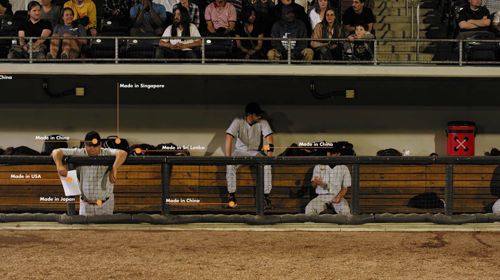Film Mon Aug 26 2013
American Made Movie Tells Story of Manufacturing Decline and Possible Revival
A new documentary describing the decline in American manufacturing and pointing a path to revival opens this week in Chicago: American Made Movie was filmed by directors Vincent Vittorio and Nathaniel Thomas McGill and stars companies and entrepreneurs like New Balance athletic shoes, Merrily Made Jewelry, Viking Ranges and Hillerich & Bradsby, makers of Louisville Slugger bats.

Baseball, the all-American game." Photo courtesy of Life Is My Movie Entertainment..
The 82-minute film opens with a baseball metaphor, showing how this all-American game works through the use of hundreds of foreign-made items of gear and clothing. The film describes, with data and expert interviews, how US manufacturing declined in the last 40 years and how technology, globalization and the search for low-wage countries contributed. Much of this information has been well known for decades but the film comes alive with the personal stories of the companies, their executives and workers. We learn how these companies almost failed and then survived. The film does a good job of weaving these personal and business stories into a message about how manufacturing can again be an important part of the US economy.
New Balance shoes, for instance, has five factories in the US and also manufactures overseas to save costs. The company advertises that one of every four pairs of shoes sold is made and assembled in the US.
Merrily Made Jewelry's owner, Merrie Buchsbaum, sells handmade jewelry with a "stars and stripes" theme; her work was sold in the Smithsonian Institution gift shop until a new manager decided it could be imitated by Chinese workers for a fraction of the cost. Later, the Smithsonian decided to open a "made in America" boutique and brought Merrily Made Jewelry back.
The city of Greenwood, Mississippi, lost many jobs when cotton growing declined. A local entrepreneur decided to open a factory making high-end, commercial-type ranges for home use. Viking Range, LLC has been in business since 1984; and since 1990, all manufacturing has been centralized in Greenwood.
The leading businessman in the film is Mark Andol, who owned General Welding and Fabricating in upstate New York. He gradually saw overseas competitors take away his business and sell almost identical products to his former customers. Overseas shipping costs, even for heavy goods, no longer are a hindrance to outsourcing, as North Carolina furniture manufacturers also have learned.
The end of Andol's story celebrates the 2010 opening of his first Made in America store, selling only products completely made in the US. The store has regular tour bus business plus an e-commerce site.
The Louisville Slugger story involves outsourcing across the Kentucky state line to Indiana. After years of manufacturing bats in New Albany, Indiana, the company brought manufacturing back to the Louisville plant, where everyone felt it belonged.
Chicago's Republic Windows and Doors could very well have been part of the film. The plant on Goose Island was closed twice by two different owners and all workers were laid off. After the second closing in 2012, workers formed a cooperative with employee investment and a line of credit from a nonprofit. New Era Windows Cooperative opened its factory on the southwest side in May 2013, as a worker-owned cooperative specializing in energy-efficient vinyl windows.
The film proposes a more balanced relationship between production and consumption. The filmmakers ask consumers to seek out locally made and American-made goods, rather than shopping at "big-box stores" that emphasize low prices on products made overseas.
Paco Underhill, a retail anthropologist, is one of the experts interviewed. His final comment nicely summarizes the filmmakers' goal: "We have to get beyond the thrill of purchase to the pride of ownership."
The documentary is interesting and well-made; it is the sort of film that might find a home on public television. While it is based on old news (manufacturing is in decline, we should buy American), the individual stories make for compelling viewing. Unfortunately, not everyone will be interested in this film or will be able to "buy American"; most families who shop at big-box stories can't afford to buy the more expensive locally produced goods.
American Made Movie opens August 30 at AMC Loews 600 N. Michigan and runs until September 5. For more information, see the film's website.








